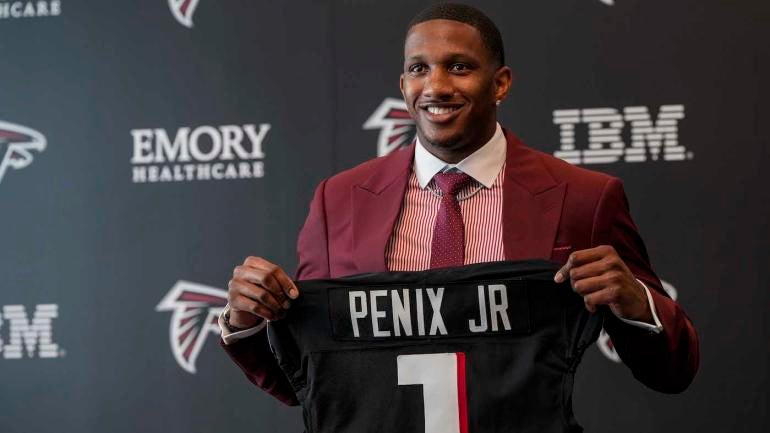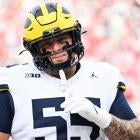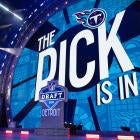
The Atlanta Falcons were responsible for the surprise of the 2024 NFL Draft, using the No. 8 overall pick on quarterback Michael Penix Jr. The move has since been almost universally questioned and critiqued, and for good reason: Why, if the Falcons truly anticipated such a premium investment at the position, did they just pay $180 million for the top free agent quarterback, Kirk Cousins, a mere 43 days prior? This is about "the future," they say, but in a future where Cousins actually plays out his four-year contract, Penix wouldn't be taking the field until age 28.
In truth, the process carries significant risk. Falcons brass quickly cited the Green Bay Packers in defending the decision: If they could spend a Day 1 pick on Jordan Love with Aaron Rodgers still in tow, why can't we have our own succession plan? The chief difference is that Rodgers had already long established himself in Green Bay -- as a literal Super Bowl champion and repeat MVP. He was aging, but he'd built enough equity, as NFL Network's Daniel Jeremiah recently put it, to withstand a potential locker room divide.
Cousins, on the other hand, has yet to take a single snap for the Falcons. He's recovering from a serious injury, looking to prove he's still capable of his proven level of play, let alone the $180 million price tag. The Falcons can say what they want, but turning around and using a top-10 pick on another quarterback suggests -- fair or not -- that the Penix selection is instead an admission they're not fully buying into Cousins as "the answer."
Which leads us to the argument for their bold swing: They might well be right!
Let's consider first the obvious downsides to the move: There is, above all, the aforementioned human element. No one should be shedding too many tears for Cousins, who's worked the quarterback market better than most throughout his career; no matter what happens in Atlanta, he's guaranteed $100 million from the Falcons, even going on 36 and coming off an Achilles tear. But if you're wanting to make your prized investment comfortable in his new workplace, the quickest way to help him command respect and take ownership of a team that's sorely lacked competent quarterback play in recent years is probably not to call him up two minutes before you stun the NFL by drafting his successor: "Hey, Kirk, you're the face of the franchise, but we're adding another one, just in case!" While it may be smart business, it no doubt has the potential to disrupt trust before the relationship even begins.
There's also the roster-building component. By spending big on a proven but aging signal-caller like Cousins in March, the Falcons essentially told the rest of the league, "We're ready to compete now." In a notoriously wide-open NFC South, with promising young skill weapons, a solid offensive line and an underrated defense, Atlanta clearly jumped into the playoff conversation by finally addressing its vacancy under center. It stands to reason, then, that the Falcons could've -- or should've -- used the No. 8 pick to further the cause, acquiring a blue-chip starter at another position of need (wide receiver, edge rusher or cornerback, for example), or even trading down to accumulate assets and give Cousins and Co. an even better shot at contending in his contractual window.
But wait, you say. Isn't this supposed to be a defense of the Penix pick? This sounds like a rehash of all the reasons the Falcons got this wrong. Well, here's the thing: The upside to Atlanta's gamble almost certainly outweighs the potential downsides.
Consider for a moment Cousins' individual value. Two things can be true here: 1.) He's been generally reliable -- efficient, accurate, etc. -- for a long time, thus justifying the Falcons' lucrative pursuit at a position of dire need. 2.) He's yet to fully translate big-time paydays to big-time postseason production. Cousins is a likable leader, there's no doubt. But to suggest Penix's arrival somehow spoils his own entrance as franchise-savior is probably a stretch; this isn't exactly Tom Brady coming over from the New England Patriots circa 2020. Throw in Cousins' age and recent injury, and suddenly it's a wonder we weren't already advocating for Atlanta to make a prominent investment in a fallback plan.
We're so quick to lambast the Falcons over their citation of the Packers' post-Rodgers model. How soon we forget what happened with Rodgers and his new team, the New York Jets, just last year. New York went all in on an aging but proven star quarterback, instantly garnering Super Bowl consideration. Then Rodgers tore his own Achilles in Week 1, and for months on end, all anyone could do was point a disdainful finger at Jets brass, wondering how on Earth they could've gone into the season with no real insurance under center. Would the Jets have looked foolish using a first-round pick on a quarterback last year? Maybe a trade up for Anthony Richardson? A trade back for Will Levis? Perhaps. But their short- and long-term title aspirations would've also been more solidified.
Along the same lines, are we sure the 2024 Falcons are even sturdier than the 2023 Jets in terms of personnel? If the chief argument against Penix is that Atlanta could've gotten Cousins another weapon for the short term, the counterpunch is this: Would another rookie -- Dallas Turner, for example, or Rome Odunze -- have elevated Atlanta to the point a Cousins-led squad would be knocking on the door of a title by 2025? This is the same quarterback who enjoyed Justin Jefferson, literally one of the NFL's best playmakers, in Minnesota and has logged a single playoff victory in nine years as a starter. Again, that's not to say Cousins isn't a quality person and player; it's just that he was never going to be a slam dunk in Atlanta. And unlike Matthew Stafford going from the Detroit Lions to the Los Angeles Rams in 2021, instantly delivering on Super Bowl dreams, Cousins didn't sign up to join an all-star lineup and battle-tested coaching staff in March.
After all this, we've said nothing about Penix the prospect. The Washington product has durability concerns. He's also got solid touch and precision when hurling it deep. He is, at least from an NFL perspective, a total unknown. But in the very plausible scenario where Cousins either 1.) doesn't fully return to form from injury, 2.) endures major hiccups transitioning teams at an older age, or 3.) doesn't live up to the pricy cost of his contract with a defining late-season run, the Falcons were always going to require another dart throw at the position. The $180 million rings loud, but in truth, Atlanta could designate Cousins a post-June 1 release following the 2024 season -- his first in a Falcons uniform -- and avoid any negative impact to 2025's salary cap. He becomes even more expendable in the 2026 offseason, essentially making this an initial two-year commitment from the team. Only time will tell if Penix is a worthwhile alternative, but he at least offers the Falcons an in-house Plan B.
There are countless factors that will ultimately determine whether the Penix plan pans out: Penix's own ability, the Falcons' roster-building around him, Cousins' contributions as both the initial starter and mentor. And certainly Atlanta could've done a better job mapping this strategy publicly and privately. But quarterback-hunting is an inherently messy business. Did Alex Smith warrant better treatment when the San Francisco 49ers replaced him with Colin Kaepernick, or the Kansas City Chiefs traded up for Patrick Mahomes amid his playoff runs? Was Carson Wentz unfairly undermined when the Philadelphia Eagles spent an early pick on Jalen Hurts? How about Sam Bradford, who got decent money from Philly just months before Wentz was drafted No. 2 overall? Or Trey Lance, who was exiled from the 49ers as soon as Brock Purdy starred as his injury replacement?
Where one quarterback is "wronged," another may be unearthed. Or inspired! Cousins is no Rodgers, but lest we forget A-Rod was so openly motivated by Green Bay drafting his successor that he proceeded to go an actual MVP tear in both 2020 and 2021. We won't ever know for sure how much Penix's selection will impact Cousins on the field, but in the event the latter rips off a career year, taking Atlanta to the promised land or even deep into the NFC playoffs, there will be no reason to slam the "excess" investment at quarterback.
The Falcons, of course, have already invited controversy by following through with their own attempt to secure both short- and long-term answers under center. It's hard enough to simply deploy one Super Bowl-caliber signal-caller. Oftentimes it's harder -- impossible, even -- to adequately possess or sustain more than one. There are too many contracts, too many egos, too many dynamics at play. And yet, in a league where some of the best quarterbacks emerge from improbable situations, from behind established veterans, or from repeated swings at solving the same glaring hole, the Falcons can't be faulted for taking their own unpopular swing.
The NFL is built on parity -- constantly leveling the playing field with a salary cap that demands tough decisions and roster turnover. So every move, at every position, is a wager. It was "safer" for the Chiefs to help Alex Smith rather than invest in Mahomes. It was "safer" for them to later keep star receiver Tyreek Hill, rather than trade him to recoup younger assets for the supporting cast. It was "safer" for the Falcons to stand by their Cousins acquisition, sell it as their "all-in" endeavor atop the lineup, and deal with the aftermath later. Their pivot may still backfire. It may ruin the trajectory of the current regime, or spoil the talent in place. It may also pay dividends that the initial plan -- in this case, adding Kirk Cousins -- never could. And if that happens, no one will be wringing their hands about a No. 8 pick. They'll just be citing the Falcons as the model for future quarterback conundrums.
![[object Object] Logo](https://sportshub.cbsistatic.com/i/2020/04/22/e9ceb731-8b3f-4c60-98fe-090ab66a2997/screen-shot-2020-04-22-at-11-04-56-am.png)


















